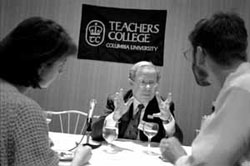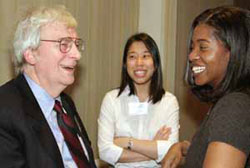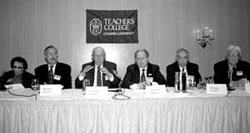Panel Discusses Strategies for Saving NYC Schools
A panel of six Teachers College faculty members and advocates for public education discussed the future of New York City's public schools at the Columbia Club on March 14. The event, titled, "Can Urban Education Be Saved?" was organized by the Metro New York City Alumni Club, a chapter of the TC Alumni Association.
Following welcoming remarks from Joseph Brosnan, Vice President for Development and External Affairs, moderator Celeste Ford, the WABC-TV education reporter, introduced the speakers. They included Henry M. Levin, the William Heard Kilpatrick Professor of Economics and Education at TC and Director of the National Center for the Study of Privatization in Education; Maxine Greene, William F. Russell Professor of the Foundations of Education (Emerita); Eugene M. Lang, business leader, philanthropist and founder of the Eugene M. Lang Foundation; Michael Rebell, Adjunct Professor of Law and Education at TC and Executive Director and Counsel for The Campaign for Fiscal Equity; Thomas Sobol, Christian A. Johnson Professor of Outstanding Educational Practice; and Henry J. Stern, former New York City Parks and Recreation Commissioner and Founder of NYCivic.
"To the question, 'Can urban education be saved?', my answer is yes, yes, yes," said Levin, who is best known as a specialist in the economics of education and human resources. "But to accomplish that, we need smaller schools and smaller classes," he said. "Good education is possible only when children are fully engaged and that is most likely to happen in small, caring environments, where people know them."
Educators must also banish the concept of remediation from their thinking, he said. "Remediation implies that our children are defective and in need of repair," Levin said. We need, he said, "to enrich their educational experiences and deepen the challenges we offer them." At the same time, teachers need to be recruited more selectively and paid higher salaries. "And we need to devote more resources to mentoring and professional development," he said.
Lang recalled being "impulsively carried away" while delivering a commencement address at a New York City junior high school in 1981 when he promised the young graduates that he would pay for their college education. His spontaneous pledge gave rise to the I Have a Dream program, providing the assurance of a college education and caring, year-round intervention for 15,000 children in 70 cities.
"My thoughts about education are anchored in three fundamental conditions," added Lang, who retired from a highly successful business career in 1997 to devote his full efforts to philanthropy. "First, that every child has the birthright to a quality education. Second, that satisfying that entitlement is this country's top priority. And third, that our public education system has the primary responsibility to achieve that priority." There are no quick fixes, he said. "Whatever well-intended solutions we come up with, they will have only a marginal impact unless they are joined with delivery systems based on reality."
Recounting a landmark lawsuit in which he challenged New York State's funding formula for public education, Rebell noted that "New York City educates 74 percent of the state's poverty-level children but receives $1,200 less per student that the state average." As a result, New York City public school students "have never had a chance to show what they could do if the city were given adequate resources and the obstacles were removed from their path," he said. "The funding gap means that we have the most unqualified teacher corps in the state. Many teachers are uncertified. Class sizes are, on average, 25 percent bigger than they are in the rest of the state. School buildings are old and in disrepair."
In its defense, the state argued that the city school system was mired in waste and inefficiency and that "throwing money at the problem wouldn't solve anything," Rebell recalled. "But the state failed to show any real examples of significant waste-or to successfully rebut the charge that money isn't the answer. Money does matter; it's an important starting point."
Sobol suggested several approaches to rescuing the city school system from what he described as its "vast middle ground of stagnant mediocrity." A first step, he said, is to realize the school system is too big to control centrally. "I think it's important to retain central authority. But we need to create smaller operating units, to provide local communities with autonomy within guidelines."
Sobol also exhorted educators to place a higher priority on diversity. He also decried the "immorality and stupidity of telling children what they need to know to function in society and holding them responsible to get that knowledge-and depriving them of adequate resources."
Stern introduced himself as "a product of the New York City public school system." Noting that when he was a student, "things were pretty good. But between my graduation from Bronx High School of Science in the early 1950s and Ocean Hill-Brownsville in 1968, something happened. The perception has been that we've gone from a working system to one that's dysfunctional." The fate of the school system, he said, "will be determined not by politicians, but by the courts-just as they determine other aspects of public policy." Meanwhile, the empowerment of "six separate appointing authorities" on the Board of Education "is a formula for chaos," he said. "I definitely support mayoral control of the board."
Speaking as a philosopher, Greene said, "I am more interested in questions than answers, more interested in possibility than prediction." She expressed the view that "alternative schools, new vision schools and charter schools must all be included in a larger, richer version of public education." Whatever future is envisioned, she said, "We must expand the notion of public education to be more inclusive, while still maintaining our commitment to the democratic ideal."
A vocal supporter of educational standards, she suggested that standards imposed "from outside" are doomed to failure. "Standards must awaken a sense of urgency in each child," she said. "They cannot be seen as a matter of compliance."
Published Friday, May. 3, 2002


